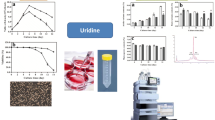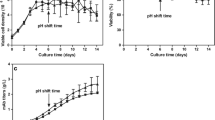Abstract
Charge variation is one of the most important heterogeneities during monoclonal antibody (mAb) manufacturing and this study presents insights into the generation of acidic charge variants during cell culture processes. Since acidic variants generate both intracellularly and extracellularly, main charge fraction collected by weak cation exchange chromatography (WCX) was incubated in harvested cell supernatant (HCS) to simulate and investigate the extracellular process firstly. It is found that the main fraction was degraded rapidly into acidic variants rather than basic variants extracellularly, and the degradation sites were located in both Fab and Fc fragments indicated by papain digestion. Besides, certain process parameters were investigated as their potential roles in the extracellular process. As a result, media composition showed significant influence on degradation while culture time point did not, suggesting that the extracellular process was a spontaneous process without enzyme catalysis. Additionally, kinetics study reveals that the extracellular process was a pseudo first-order reaction. The E app value (21.59 kcal/mol) estimated from the Arrhenius equation suggests that the extracellular degradation might be mainly attributed to asparagine deamidation. Furthermore, we established an acidic variants generation model, indicating that the extracellular process plays a dominant role in modulating the final acidic variant level. This study provides better understanding for controlling product heterogeneity in mAb manufacturing.








Similar content being viewed by others
References
Abu-Absi SF, Yang L, Thompson P, Jiang C, Kandula S, Schilling B, Shukla AA (2010) Defining process design space for monoclonal antibody cell culture. Biotechnol Bioeng 106(6):894–905. https://doi.org/10.1002/bit.22764
Aggarwal SR (2014) What’s fueling the biotech engine: 2012—2013. Nat Biotechnol 32(1):32–39. https://doi.org/10.1038/nbt.2794
Aghamohseni H, Ohadi K, Spearman M, Krahn N, Moo-Young M, Scharer JM, Butler M, Budman HM (2014) Effects of nutrient levels and average culture pH on the glycosylation pattern of camelid-humanized monoclonal antibody. J Biotechnol 186:98–109. https://doi.org/10.1016/j.jbiotec.2014.05.024
Banks DD, Gadgil HS, Pipes GD, Bondarenko PV, Hobbs V, Scavezze JL, Kim J, Jiang XR, Mukku V, Dillon TM (2008) Removal of cysteinylation from an unpaired sulfhydryl in the variable region of a recombinant monoclonal IgG1 antibody improves homogeneity, stability, and biological activity. J Pharm Sci 97(2):775–790. https://doi.org/10.1002/jps.21014
Banks DD, Hambly DM, Scavezze JL, Siska CC, Stackhouse NL, Gadgil HS (2009) The effect of sucrose hydrolysis on the stability of protein therapeutics during accelerated formulation studies. J Pharm Sci 98(12):4501–4510. https://doi.org/10.1002/jps.21749
Bruhlmann D, Jordan M, Hemberger J, Sauer M, Stettler M, Broly H (2015) Tailoring recombinant protein quality by rational media design. Biotechnol Prog 31(3):615–629. https://doi.org/10.1002/btpr.2089
Cleland JL, Powell MF, Shire SJ (1992) The development of stable protein formulations: a close look at protein aggregation, deamidation, and oxidation. Crit Rev Ther Drug Carrier Syst 10(4):307–377
Dick LW Jr, Kim C, Qiu D, Cheng KC (2007) Determination of the origin of the N-terminal pyro-glutamate variation in monoclonal antibodies using model peptides. Biotechnol Bioeng 97(3):544–553
Du Y, Walsh A, Ehrick R, Xu W, May K, Liu H (2012) Chromatographic analysis of the acidic and basic species of recombinant monoclonal antibodies. MAbs 4(5):578–585. https://doi.org/10.4161/mabs.21328
Gandhi S, Ren D, Xiao G, Bondarenko P, Sloey C, Ricci MS, Krishnan S (2012) Elucidation of degradants in acidic peak of cation exchange chromatography in an IgG1 monoclonal antibody formed on long-term storage in a liquid formulation. Pharm Res 29(1):209–224. https://doi.org/10.1007/s11095-011-0536-0
Geiger T, Clarke S (1987) Deamidation, isomerization, and racemization at asparaginyl and aspartyl residues in peptides. Succinimide-linked reactions that contribute to protein degradation. J Biol Chem 262(2):785–794
Harris RJ, Kabakoff B, Macchi FD, Shen FJ, Kwong M, Andya JD, Shire SJ, Bjork N, Totpal K, Chen AB (2001) Identification of multiple sources of charge heterogeneity in a recombinant antibody. J Chromatogr B 752(2):233–245. https://doi.org/10.1016/S0378-4347(00)00548-X
Horvath B, Mun M, Laird MW (2010) Characterization of a monoclonal antibody cell culture production process using a quality by design approach. Mol Biotechnol 45(3):203–206. https://doi.org/10.1007/s12033-010-9267-4
Hossler P, Wang M, McDermott S, Racicot C, Chemfe K, Zhang Y, Chumsae C, Manuilov A (2015) Cell culture media supplementation of bioflavonoids for the targeted reduction of acidic species charge variants on recombinant therapeutic proteins. Biotechnol Prog 31(4):1039–1052. https://doi.org/10.1002/btpr.2095
Ivarsson M, Villiger TK, Morbidelli M, Soos M (2014) Evaluating the impact of cell culture process parameters on monoclonal antibody N-glycosylation. J Biotechnol 188:88–96. https://doi.org/10.1016/j.jbiotec.2014.08.026
Khawli LA, Goswami S, Hutchinson R, Kwong ZW, Yang J, Wang X, Yao Z, Sreedhara A, Cano T, Tesar D, Nijem I, Allison DE, Wong PY, Kao YH, Quan C, Joshi A, Harris RJ, Motchnik P (2010) Charge variants in IgG1: isolation, characterization, in vitro binding properties and pharmacokinetics in rats. MAbs 2(6):613–624. https://doi.org/10.4161/mabs.2.6.13333
Kishishita S, Nishikawa T, Shinoda Y, Nagashima H, Okamoto H, Takuma S, Aoyagi H (2015) Effect of temperature shift on levels of acidic charge variants in IgG monoclonal antibodies in Chinese hamster ovary cell culture. J Biosci Bioeng 119(6):700–705. https://doi.org/10.1016/j.jbiosc.2014.10.028
Liu H, Gaza-Bulseco G, Faldu D, Chumsae C, Sun J (2008) Heterogeneity of monoclonal antibodies. J Pharm Sci 97(7):2426–2447. https://doi.org/10.1002/jps.21180
Liu H, Nowak C, Shao M, Ponniah G, Neill A (2016) Impact of cell culture on recombinant monoclonal antibody product heterogeneity. Biotechnol Prog 32(5):1103–1112. https://doi.org/10.1002/btpr.2327
Luo J, Zhang J, Ren D, Tsai WL, Li F, Amanullah A, Hudson T (2012) Probing of C-terminal lysine variation in a recombinant monoclonal antibody production using Chinese hamster ovary cells with chemically defined media. Biotechnol Bioeng 109(9):2306–2315. https://doi.org/10.1002/bit.24510
Mallaney M, Wang SH, Sreedhara A (2014) Effect of ambient light on monoclonal antibody product quality during small-scale mammalian cell culture process in clear glass bioreactors. Biotechnol Prog 30(3):562–570. https://doi.org/10.1002/btpr.1920
Moorhouse K, Nashabeh W, Deveney J, Bjork N, Mulkerrin M, Ryskamp T (1997) Validation of an HPLC method for the analysis of the charge heterogeneity of the recombinant monoclonal antibody IDEC-C2B8 after papain digestion. J Pharm Biomed Anal 16(4):593–603. https://doi.org/10.1016/S0731-7085(97)00178-7
Nagashima H, Watari A, Shinoda Y, Okamoto H, Takuma S (2013) Application of a quality by design approach to the cell culture process of monoclonal antibody production, resulting in the establishment of a design space. J Pharm Sci 102(12):4274–4283. https://doi.org/10.1002/jps.23744
Pace AL, Wong RL, Zhang YT, Kao YH, Wang YJ (2013) Asparagine deamidation dependence on buffer type, pH, and temperature. J Pharm Sci 102(6):1712–1723. https://doi.org/10.1002/jps.23529
Robinson NE, Robinson AB (2001) Deamidation of human proteins. Proc Natl Acad Sci U S A 98(22):12409–12413. https://doi.org/10.1073/pnas.221463198
Rouiller Y, Perilleux A, Vesin MN, Stettler M, Jordan M, Broly H (2014) Modulation of mAb quality attributes using microliter scale fed-batch cultures. Biotechnol Prog 30(3):571–583. https://doi.org/10.1002/btpr.1921
Santora L, Krull I, Grant K (1999) Characterization of recombinant human monoclonal tissue necrosis factor-α antibody using cation-exchange HPLC and capillary isoelectric focusing. Anal Biochem 275(1):98–108. https://doi.org/10.1006/abio.1999.4275
Stratton LP, Kelly RM, Rowe J, Shively JE, Smith DD, Carpenter JF, Manning MC (2001) Controlling deamidation rates in a model peptide: effects of temperature, peptide concentration, and additives. J Pharm Sci 90(12):2141–2148. https://doi.org/10.1002/jps.1165
Vijayasankaran N, Varma S, Yang Y, Mun M, Arevalo S, Gawlitzek M, Swartz T, Lim A, Li F, Zhang B, Meier S, Kiss R (2013) Effect of cell culture medium components on color of formulated monoclonal antibody drug substance. Biotechnol Prog 29(5):1270–1277. https://doi.org/10.1002/btpr.1772
Vlasak J, Ionescu R (2008) Heterogeneity of monoclonal antibodies revealed by charge-sensitive methods. Curr Pharm Biotechnol 9(6):468–481. https://doi.org/10.2174/138920108786786402
Vlasak J, Bussat MC, Wang S, Wagner-Rousset E, Schaefer M, Klinguer-Hamour C, Kirchmeier M, Corvaia N, Ionescu R, Beck A (2009) Identification and characterization of asparagine deamidation in the light chain CDR1 of a humanized IgG1 antibody. Anal Biochem 392(2):145–154. https://doi.org/10.1016/j.ab.2009.05.043
Wakankar AA, Borchardt RT (2006) Formulation considerations for proteins susceptible to asparagine deamidation and aspartate isomerization. J Pharm Sci 95(11):2321–2336. https://doi.org/10.1002/jps.20740
Yan B, Steen S, Hambly D, Valliere-Douglass J, Vanden Bos T, Smallwood S, Yates Z, Arroll T, Han Y, Gadgil H, Latypov RF, Wallace A, Lim A, Kleemann GR, Wang W, Balland A (2009) Succinimide formation at Asn 55 in the complementarity determining region of a recombinant monoclonal antibody IgG1 heavy chain. J Pharm Sci 98(10):3509–3521. https://doi.org/10.1002/jps.21655
Yin S, Pastuskovas CV, Khawli LA, Stults JT (2013) Characterization of therapeutic monoclonal antibodies reveals differences between in vitro and in vivo time-course studies. Pharm Res 30(1):167–178. https://doi.org/10.1007/s11095-012-0860-z
Yuk IH, Zhang B, Yang Y, Dutina G, Leach KD, Vijayasankaran N, Shen AY, Andersen DC, Snedecor BR, Joly JC (2011) Controlling glycation of recombinant antibody in fed-batch cell cultures. Biotechnol Bioeng 108(11):2600–2610. https://doi.org/10.1002/bit.23218
Zhang W, Czupryn MJ (2003) Analysis of isoaspartate in a recombinant monoclonal antibody and its charge isoforms. J Pharm Biomed Anal 30(5):1479–1490. https://doi.org/10.1016/S0731-7085(02)00479-X
Zhang T, Bourret J, Cano T (2011) Isolation and characterization of therapeutic antibody charge variants using cation exchange displacement chromatography. J Chromatogr A 1218(31):5079–5086. https://doi.org/10.1016/j.chroma.2011.05.061
Zhang X, Sun YT, Tang H, Fan L, Hu D, Liu J, Liu X, Tan WS (2015a) Culture temperature modulates monoclonal antibody charge variation distribution in Chinese hamster ovary cell cultures. Biotechnol Lett 37(11):2151–2157. https://doi.org/10.1007/s10529-015-1904-3
Zhang X, Tang H, Sun YT, Liu X, Tan WS, Fan L (2015b) Elucidating the effects of arginine and lysine on a monoclonal antibody C-terminal lysine variation in CHO cell cultures. Appl Microbiol Biotechnol 99(16):6643–6652. https://doi.org/10.1007/s00253-015-6617-y
Funding
This work was supported by the National Natural Science Foundation of China (No. 21406066) and the National Science and Technology Major Project (No. 2013ZX10004003-003-003).
Author information
Authors and Affiliations
Corresponding authors
Ethics declarations
This article does not contain any studies with human participants or animals performed by any of the authors.
Conflict of interest
The authors declare that they have no conflict of interest.
Electronic supplementary material
ESM 1
(PDF 230 kb).
Rights and permissions
About this article
Cite this article
Tang, H., Miao, S., Zhang, X. et al. Insights into the generation of monoclonal antibody acidic charge variants during Chinese hamster ovary cell cultures. Appl Microbiol Biotechnol 102, 1203–1214 (2018). https://doi.org/10.1007/s00253-017-8650-5
Received:
Revised:
Accepted:
Published:
Issue Date:
DOI: https://doi.org/10.1007/s00253-017-8650-5




